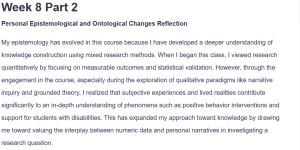Week 8 Part 2
Personal Epistemological and Ontological Changes Reflection
My epistemology has evolved in this course because I have developed a deeper understanding of knowledge construction using mixed research methods. When I began this class, I viewed research quantitatively by focusing on measurable outcomes and statistical validation. However, through the engagement in the course, especially during the exploration of qualitative paradigms like narrative inquiry and grounded theory, I realized that subjective experiences and lived realities contribute significantly to an in-depth understanding of phenomena such as positive behavior interventions and support for students with disabilities. This has expanded my approach toward knowledge by drawing me toward valuing the interplay between numeric data and personal narratives in investigating a research question.
The course has also transformed my view of the role of a researcher in a research study. Currently, I understand that in research, I am not just regarded as an objective observer but part of the research process, tasked with the responsibility of interpreting quantitative trends and qualitative insights. This ontological shift resonated with the pragmatic view the course introduced me to, whereby one realizes that knowledge production is contextual and research can be done to understand and, at the same time, improve educational practice. In this light, I am encouraged to consider the complexity of the mixed-methods approach in developing studies that would account for the multiple realities that students and educators are likely to experience.
Development of Skill and Resources Reflection
This course has helped me significantly improve my research skills through systematic training in developing research questions and hypotheses and the sampling strategy in quantitative and qualitative studies. I applied the formulation and refinement of the problem and purpose statements, ensuring their nature was congruent with theoretical frameworks such as behaviorism. This will be useful in my future research projects, especially the dissertation or capstone that requires robust studies to be designed. I can also apply this knowledge to complete assignments on sampling techniques because understanding sampling techniques has enhanced my ability to choose representative samples, which would be helpful in future empirical studies.
The class has also introduced me to several key resources I will use during my research. Access to databases such as Google Scholar for dissertations and scholarly articles enhanced the ability to locate and critically analyze relevant literature. Assignments provided the opportunity to explore the tools and methodologies that will be instrumental in future research involving diverse populations, such as stratified and purposive sampling. These resources and strategies have prepared me for the advanced research courses while at the same time giving me the confidence to address various challenges in designing and executing meaningful studies that contribute to the education field.
ORDER A PLAGIARISM-FREE PAPER HERE
We’ll write everything from scratch
Question 
Research_and_Toolkit_Journal.docx
DP_DM_Template_5.2023.docx – Google Docs
This week, the expectation is that you complete the the toolkit and submit the entire toolkit: 1) complete the following summative reflections sections of the journal (put at the end of the toolkit):
Reflection on Personal Epistemological and Ontological Changes (at least 2 paragraphs)
- In at least 2 paragraphs, reflect on how the content of this course may have changed your ways of knowing (epistemology) or ways of being (ontology) as they relate to conducting research.

Week 8 Part 2
Reflection on Skill and Resource Development (at least 2 paragraphs), and 2) then, submit the entire, completed toolkit per template instructions.
- In at least 2 paragraphs, reflect on how the content of this course improved your research skills and your ability to independently find resources to support your future research projects, including your future research courses and dissertation or capstone project.
